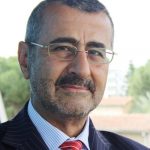The Greeks have finally come to the realization that despite a period of relative calmness Turkey is not about to abandon its assertive behavior in the East Med. In addition, face-to-face negotiations have not gone anywhere and it is becoming apparent to Greece that relying on Turkey’s willingness to negotiate in good faith, may be a risky proposition, especially if Greece does not hold any other serious cards to play.
Turkey appears to have its own unique interpretation of international law, tailored to its own demands. It uses this to create fait-accompli situations, from which it then offers to ‘negotiate’. A cartoon in the Economist last year aptly describes the challenges.
The two countries almost came to war on a number of occasions, particularly during the second half of last year over continental shelf delimitation in the East Med, in an area perceived to hold hydrocarbon deposits.
Tensions resurfaced again more recently with President Recep Tayyip Erdogan repeatedly stating that Turkey will carry on exploring for gas in the East Med. End of September the Turkish navy chased away the Italian-operated survey vessel Nautical Geo that was surveying the EastMed gas pipeline route – a project funded by the European Commission – in international waters between Crete and Cyprus. Turkey claimed that the area is part of its continental shelf under its maritime memorandum with Libya, even though this is not recognized by anybody else. This brings memories of the belligerent actions by the Turkish navy in February 2018 when it stopped ENI’s drilling rig by force from reaching block 3 in Cyprus EEZ
Turkey is also threatening to repeat its own surveys in Cyprus EEZ if ExxonMobil proceeds with its planned appraisal drilling in block 10 by the end of the year.
It is these types of actions by Turkey that have led Greece to reconsider its defense capabilities, at a time when the two countries are supposed to be negotiating a solution to their problems. This is what the Borrell plan envisaged, endorsed by EU leaders in March this year. It recognized that Turkish actions in the East Med challenge directly the rights of Cyprus to its EEZ and the maritime rights of Greece in the region and provided for de-escalation of tension in the East Med through the cessation of illegal drilling activities by Turkey and the resumption of bilateral talks between Greece and Turkey. In particular, the plan required Turkey to refrain from further unilateral actions in violation of international law.
The plan was also clear on EEZ and continental shelf delimitation. These “should be addressed through dialogue under international law, including the UN Convention on the Law of the Sea, and if no solution is found, this issue should be referred to the International Court of Justice in The Hague.” Clearly, it has not progressed and, if anything, it has regressed.
On October 14, Greece’s Foreign Minister, Nikos Dendias and US Secretary of State Antony Blinken signed the updated US-Greece Mutual Defense Cooperation Agreement. Blinken commented that this deepens the alliance between the two countries. Dendias did not mince his words when he said that Greece is facing the “threat of war”, even in exercising its sovereign rights.
This was preceded in late September by an unprecedented strategic defense agreement between Greece and France that cements their evolving close relationship. It provides for the acquisition of three defense and intervention frigates for the Hellenic Navy for €2.9 billion, with an option for a fourth, as well as 24 Rafale fighter jets.
For the first time, such an agreement joins two NATO members to support one another from an attack on the territory of either, even if originating inside the alliance. Greece’s prime minister, Kyriakos Mitsotakis, said “The defense of European interests in the Mediterranean now acquires new substance…If attacked, our country will have at its side the most powerful military on the continent, the sole European nuclear power.”
For France this was an important win after the debacle of its submarine deal with Australia.
France and Greece see this agreement as the beginnings of an independent European defense and foreign policy. Greece, through these defense pacts and its expanding arms program, is strengthening its ability to counter Turkish threats, but these are not substitutes for negotiation and political solutions.
Mitsotakis recognizes this. He told the 76th UN General Assembly “I have a vision for the Eastern Mediterranean. Instead of fighting last century’s battles over hydrocarbons, a fading commodity, we have to join forces to cooperate against new common enemies – the climate crisis which affects both our countries equally, but also the threat of illegal migration.”
The way forward in the East Med remains fraught. What is needed is a solution to problems through negotiation. It requires mutual respect between all key players, peaceful means of resolving disputes, and constructive dialogue in good faith.
With this in mind, Greece, Cyprus and Egypt plan to hold the 9th trilateral summit between the three countries at Kavalla in Greece on October 19. Energy will be a key part of the Agenda.
On another positive note for regional cooperation in the energy sector, Cyprus and Egypt signed on October 16 a memorandum of understanding to build an electricity interconnector between the two countries, with onward extension to Greece. In an era of transiting to clean energy, this is an important development that will eventually facilitate the wider deployment of renewables in the region.



